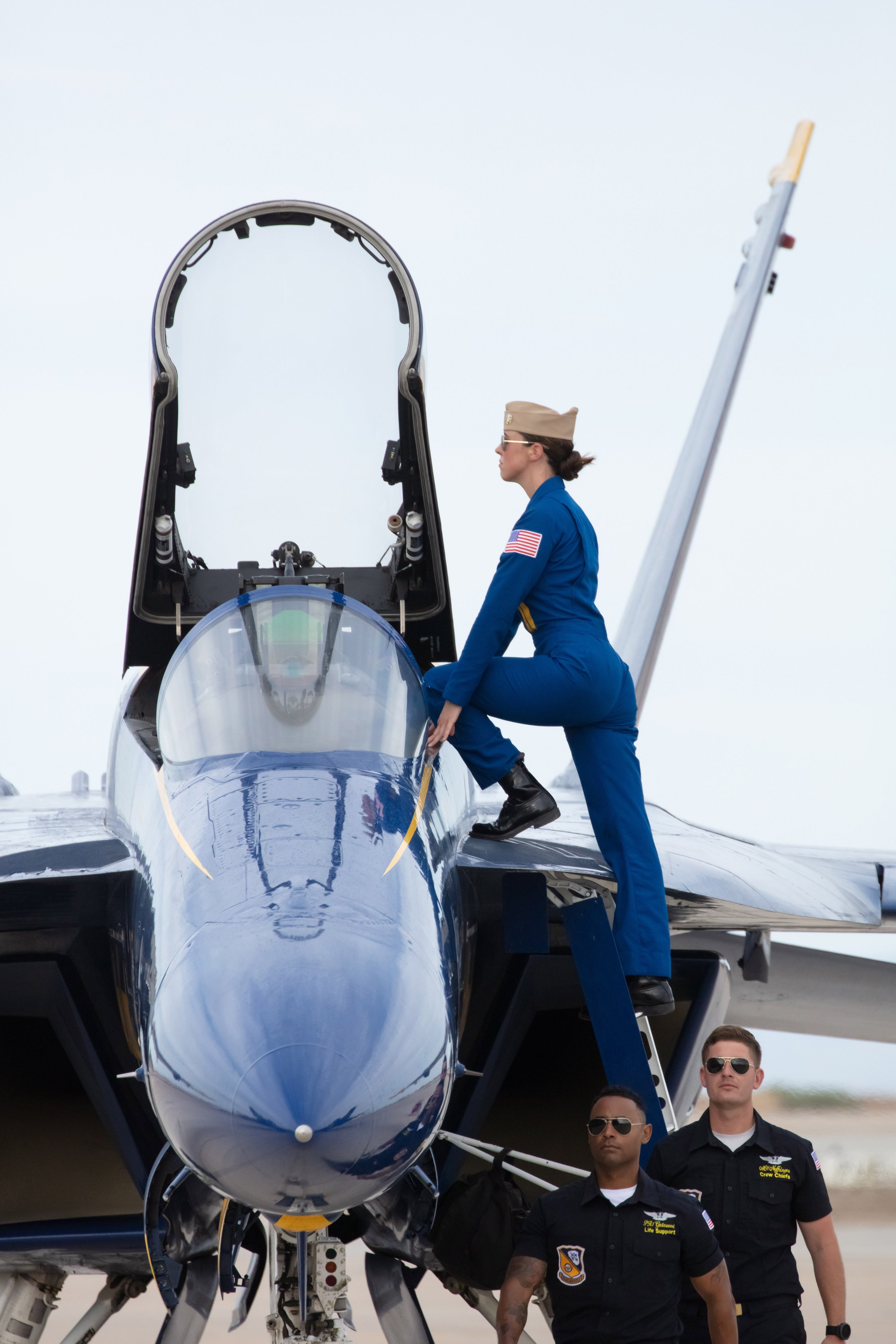Alan de Herrera
Freelance writer & photojournalist
Female Navy pilot makes historic debut with the Blue Angels
Military Times
Story and photos by Alan De Herrera
March 11, 2023
EL CENTRO, California –– Warm desert winds blew calmly out of the west as Lt. Amanda Lee climbed into the cockpit of her blue and gold F/A-18E/F Super Hornet for her historic first public flight as as member of the Navy’s Blue Angels. It was a perfect day to fly.
Lee and Lt. Cmdr. Thomas Zimmerman were selected for the renowned flight demonstration team in July of 2022, making Lee the first woman to earn a coveted spot on the team. Both pilots completed an intensive five-month training program under the command of the Blue Angels’ new flight leader Cmdr. Alexander Armatas, who joined the team in August 2022.
“We had an overwhelming number of applicants from all over the globe,” said Capt. Brian Kesselring, the former commanding officer and flight leader of the Blue Angels. “We look forward to passing on the torch and watching the incredible things this team will accomplish in 2023.”
Although Lee is the first fighter jet pilot to fly with The Blues squadron, she is actually the second female pilot to fly for the team. Marine Maj. Katie Higgins broke that barrier in 2014 flying the team’s C-130 “Fat Albert” for two seasons.
With a deafening roar of the Super Hornets’ engines, Lee and her teammates soared through the Southern California sky in tight formation March 11, captivating spectators here with breathtaking aerobatic maneuvers like the Double Farvel, with two aircraft inverted, and the Diamond Roll. They then performed the jaw-dropping Diamond 360, where the Blues’ aircraft fly as close as 18 inches from wingtip to canopy.
Lee is one of six Navy personnel to join the ranks of the Blue Angels for the 2023 season. In her new role as the Left Wing No. 3 demo pilot, she will further the legacy of female aviators proudly serving in the Navy around the world. For over 55 years, hundreds of women have served with the Blues in a variety of capacities.
The Mounds View, Minnesota, native, who goes by the call sign “Stalin,” was assigned to the “Gladiators” of Strike Fighter Squadron 106, out of Naval Air Station Oceana in Virginia Beach, Virginia, at the time of her selection for the flight demonstration team.
While attending the University of Minnesota Duluth in 2007, Lee enlisted in the Navy as an aviation electronics technician and later reported to her first command, the VFA-136 “Knighthawks” at Naval Air Station Lemoore, California.
Two years later, she was selected to commission as a pilot through the Seaman-to-Admiral program. In 2010, she attended the Naval Science Institute for officer training in Newport, Rhode Island, and simultaneously began her studies at Old Dominion University in Norfolk, Virginia, where she received a bachelor of science degree in biochemistry.
She earned her commission in August 2013, and reported to NAS Pensacola, Florida, to begin training as a naval pilot. Lee was designated naval aviator in April 2016.
Lee went on to serve two combat deployments aboard the aircraft carrier Harry S. Truman supporting Operation Inherent Resolve, Operation Freedom Sentinel and NATO Exercise Trident Juncture. In that time, she accumulated more than 1,400 flight hours and completed more than 225 carrier-arrested landings.
Her decorations include four Navy Achievement Medals and various personal and unit awards. In 2019 Lee also participated in the first ever all-female flyover honoring retired Navy Capt. Rosemary Mariner, the first woman to fly a front-line tactical strike fighter jet in the U.S. Navy.
Lee’s groundbreaking flight kicked off the start of the team’s 2023 season, with the theme of the show commemorating “50 Years of Women Flying in the Navy.”
“In 2023, we reflect on our Naval Aviation history and pay tribute to all of our women Naval Aviators and all those who have come after them,” a Navy release states. “In 1973, the first eight women began flight school in Pensacola, and one year later six of those women –– “The First Six” –– earned their Wings of Gold.
“Today, our women aviators project power from the sea and in every type, model, and series aircraft,” it continues. “They fly and fight in all strike missions, hunt submarines, protect the integrity of our nuclear triad, supply essential cargo and personnel to every corner of the globe, and rescue those in distress at sea and ashore.”






